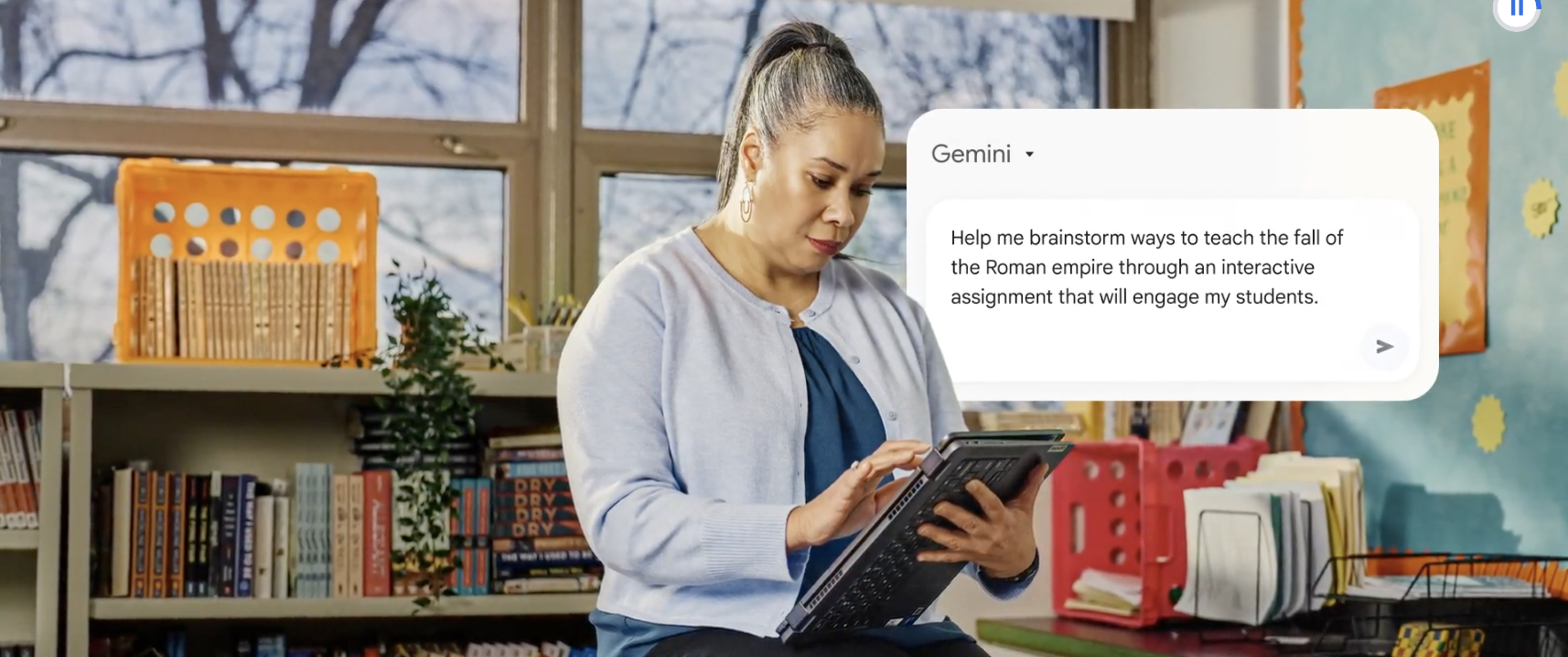How New Google Tools Will Transform Higher Education

As the summer season begins to fade, a different type of energy is building - the excitement of beginning a new school year. This year, Google has rolled out a suite of innovative tools designed not only to streamline your workflow and ignite student curiosity but also to increase accessibility and create differentiated learning experiences for all learners. Get ready to discover the latest AI-powered features designed to empower all educators. While these tools are great for everyone, the examples shared here are specifically tailored for higher education and teacher preparation programs dedicated to meeting every student's needs.
💎 Advanced Tools in Gemini
Gemini offers even more advanced tools and capabilities to make interactions beyond simple chats. Features like Deep Research and Guided Learning allow users to have a thought partner when researching or learning. For higher education, this translates into powerful new workflows to:
-
Personalize Learning: A student struggling with a complex calculus problem could use Guided Learning to break down a concept step-by-step, receiving tailored explanations, diagrams, and quizzes along the way. This creates a personalized learning experience that is perfect for preparing for exams or reinforcing difficult concepts.
-
Create Comprehensive Reports: A teacher preparation student can conduct in-depth analyses of pedagogical topics, such as the effectiveness of implementing Project-Based Learning using Deep Research. Gemini will then produce a synthesized report that compiles and summarizes the relevant research, providing the student with a solid, evidence-based foundation for their project, saving them countless hours of searching through educational databases.
-
Simulate Classroom Scenarios: A student teacher preparing to lead their first lesson on a complex topic like the Scientific Method could use Guided Learning. They could prompt Gemini to “act as a fifth-grade student who is struggling to understand the difference between a hypothesis and a prediction." Gemini will then engage in back-and-forth role-playing to support the student teacher in preparing and practicing for their lesson.
📓 NotebookLM: A Video Summary Upgrade
NotebookLM has received a significant update that makes it even more powerful for research and knowledge synthesis. In addition to its existing features, you can now generate a Video Overview of your content. This new feature creates a narrated, AI-generated video with slides, pulling in images, diagrams, quotes, and data from your uploaded source material. It's a fantastic tool for:
-
Literature Reviews and Dissertations: A graduate student writing a literature review can upload dozens of PDFs and research papers and then use NotebookLM to synthesize key findings, compare theoretical frameworks, and generate a "Briefing Document" to organize their thoughts.
-
Learning On The Go: A student preparing for a final exam can upload their lecture notes and textbook chapters, then generate an "Audio Overview" to listen to a conversational, podcast-style summary of the content while on a walk or commute.
🎥 Google Vids: AI-Powered Video Creation for Everyone
Google Vids is an AI-powered video creation app now available across all Google Workspace for Education editions. It empowers you to create professional videos for work or teaching, even if you have no video production experience. With Google Vids, you can:
-
Design Micro-Lectures: An education professor could create a series of micro-lectures on specific pedagogical theories, such as 10-minute videos on topics like constructivism or behaviorism. This would allow students to engage with complex topics at their own pace and revisit key concepts as needed throughout the course.
-
Facilitate Student Projects: Students can use Google Vids to create a video essay on a historical event, a demonstration of a scientific principle, or a pitch for a research idea, collaborating in real-time just like they would in Docs or Slides.
-
Create Video Tutorials: A chemistry professor can make a short explainer video on a difficult lab procedure, using Vids to quickly combine screen recordings, a voiceover, and custom graphics.
-
Produce Dynamic Portfolios: A student teacher could use Google Vids to build a portfolio for a final evaluation or in preparation for a job interview. The video could include clips of them teaching a lesson, sharing their personal reflection on their teaching philosophy, and so much more.
🧱 Building Blocks in Google Slides: Design Like a Pro
Beyond AI tools, Google released additional features and tools to support educators and learners this school year. One example is a new Google Slides update to help with producing presentations. Building on the success of building blocks in Google Docs, this feature is now available in Google Slides. This update provides pre-designed, editable components that help you create polished presentations in less time. Instead of building from scratch, you can insert professionally formatted Building Block elements to help organize:
-
Academic Presentations: A biology professor can use the "Key Statistics" building block to highlight a critical data point from a research study. An academic advisor might use the “Agenda” block to create a clear and organized presentation for a first-year orientation.
-
Student Projects: An education student can use building blocks to create a dynamic presentation on educational philosophers, incorporating "Cards" for key accomplishments and a "Quote" block for a famous saying, all with a consistent, professional design.
🏁 Opportunity to Further Learning
These are just a few of the exciting advancements Google has made to support the education community. By embracing these AI-powered tools, you can create a more inclusive, dynamic, and engaging learning environment for all students.
To continue this conversation and see these tools in action, please join us for an exclusive event on September 22nd. This FREE professional development opportunity will provide you with practical strategies for using Google AI to support Universal Design for Learning (UDL) guidelines and enhance the accessibility of your courses.
Don't miss this chance to empower yourself and your students for a truly successful academic year. We can’t wait to see you there!


.png?width=352&name=Five%20Star%20AI%20Banner%20(1).png)

.png?width=352&name=Applications%20now%20open!%20(1).png)